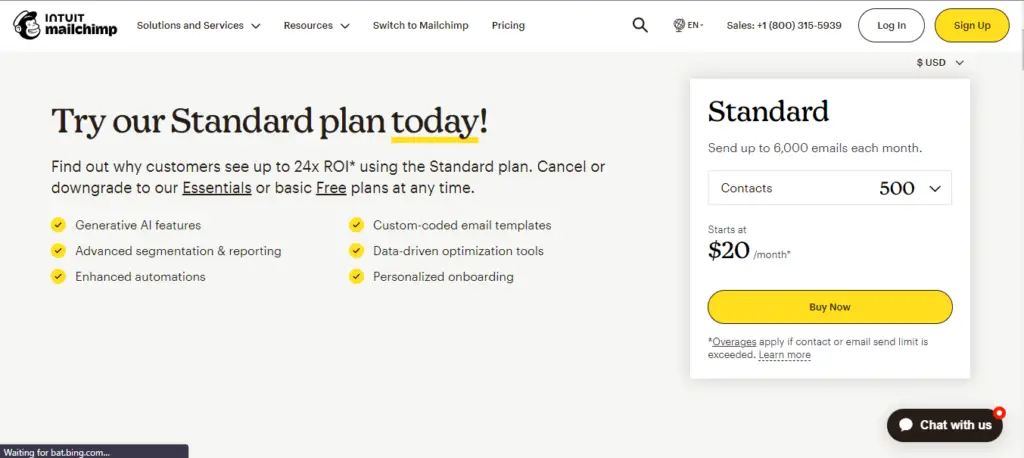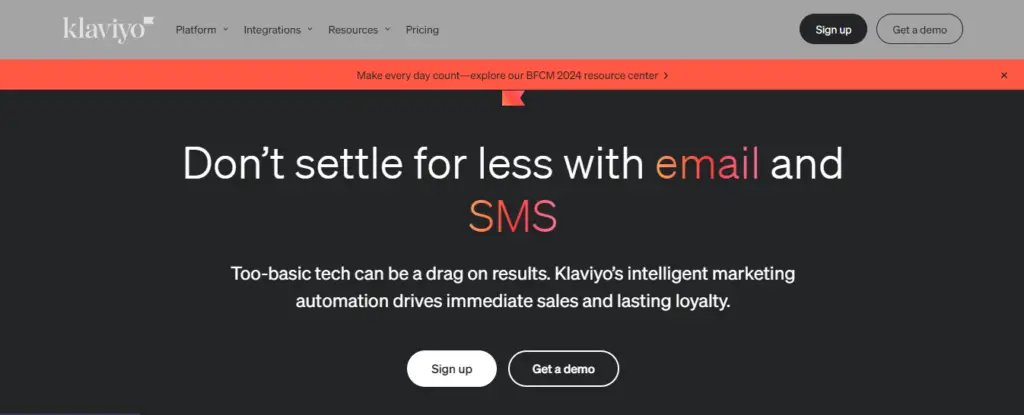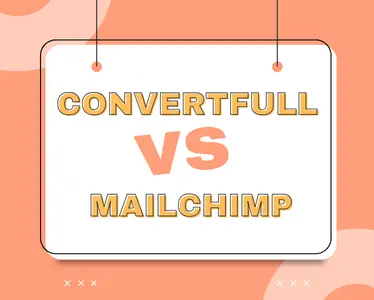MailChimp vs Klaviyo: Which Email Marketing Tool is Right for Your Business?

Table of Contents
Introduction
In today’s digital landscape, email marketing has become an indispensable tool for businesses aiming to grow and maintain strong relationships with their customers. By directly reaching customers in their inboxes, businesses can deliver personalized messages, promotions, and updates that foster engagement and drive conversions. As companies strive to optimize their marketing strategies, selecting the right email marketing tool is crucial.
When it comes to choosing the best platform for email marketing, two names often rise to the top: MailChimp and Klaviyo. Both tools offer robust features tailored to different business needs, but how do you decide which one is right for you? This article will provide a detailed comparison of MailChimp vs. Klaviyo, helping you make an informed decision based on your business goals and requirements.
Overview of Email Marketing Tools

What Are Email Marketing Tools?
Email marketing tools are software platforms that enable businesses to create, manage, and analyze email campaigns. These tools typically offer features such as customizable templates, automation capabilities, audience segmentation, and detailed reporting. By streamlining the process of designing and sending emails, these tools allow businesses to efficiently communicate with their customers, whether it’s for promoting a new product, sharing important updates, or nurturing leads through a sales funnel.
The Importance of Choosing the Right Tool
Selecting the right email marketing tool is more than just a matter of convenience—it can significantly impact your overall marketing strategy. The right tool will not only make it easier to reach your target audience but also provide insights into how your campaigns are performing, allowing you to refine your approach over time. For example, a platform with advanced automation features can save time by triggering emails based on customer behavior, while detailed analytics can help you understand what resonates with your audience.
In contrast, using a tool that doesn’t align with your business needs can lead to inefficiencies, missed opportunities, and even frustration for your marketing team. Therefore, understanding the strengths and limitations of each tool is essential to maximizing the return on your email marketing efforts.
By comparing MailChimp and Klaviyo in this article, we aim to guide you in selecting the email marketing tool that best aligns with your business objectives, ensuring that your email campaigns are both effective and scalable.
MailChimp: Features, Pricing, and Pros & Cons

Features Overview
MailChimp is a popular email marketing tool that offers a variety of features to help businesses create, automate, and analyze their email campaigns.
Email Campaign Creation: MailChimp provides a user-friendly drag-and-drop editor that makes it easy to create visually appealing email campaigns. Whether you’re sending newsletters, product promotions, or updates, the platform offers customizable templates to suit different needs.
Automation Capabilities: MailChimp’s automation tools allow businesses to set up triggered emails based on user behavior, such as welcome emails, abandoned cart reminders, or follow-ups. This feature helps businesses maintain engagement with minimal effort.
Analytics and Reporting: With MailChimp, you can track the performance of your email campaigns through detailed analytics. The platform provides insights into open rates, click-through rates, and other metrics that are crucial for optimizing your marketing strategy.
Integrations and App Support: MailChimp integrates with a wide range of apps and platforms, including e-commerce systems, CRM tools, and social media channels. This makes it easier to manage all your marketing efforts from a single dashboard.
Pricing Plans
MailChimp offers several pricing plans to cater to different business sizes and needs.
Free Plan Details: The Free Plan is ideal for small businesses or those just starting with email marketing. It includes basic features like email campaign creation, automation, and basic reporting. However, it is limited to 500 contacts and 3,500 emails per month.
Paid Plan Tiers and What They Include:
- Essentials Plan: Starting at $13/month, this plan offers more advanced features like A/B testing, custom branding, and 24/7 email support.
- Standard Plan: Priced at $20/month, it includes advanced audience insights, retargeting ads, and advanced automation features.
- Premium Plan: At $350/month, the Premium Plan is designed for larger businesses and offers advanced segmentation, multivariate testing, and priority support.
Pros
User-Friendly Interface: One of MailChimp’s biggest strengths is its intuitive and easy-to-use interface, which makes it accessible even to those new to email marketing.
Extensive Integrations: MailChimp supports a wide range of integrations, making it versatile and able to fit into various marketing tech stacks seamlessly.
Cons
Limited Advanced Features in Lower Plans: While MailChimp is powerful, some of its more advanced features are only available in the higher-tier plans. This can be a drawback for small businesses or those on a tight budget.
Klaviyo: Features, Pricing, and Pros & Cons

Features Overview
Klaviyo is an email marketing platform that is particularly well-suited for e-commerce businesses, offering advanced segmentation and personalization capabilities.
Advanced Segmentation: Klaviyo excels in audience segmentation, allowing businesses to target specific groups of customers based on their behavior, purchase history, and more. This results in highly personalized email campaigns that drive better engagement.
Automation and Personalization: Klaviyo’s automation tools are robust, enabling businesses to create complex email workflows. These can include triggered emails based on various customer actions, such as browsing behavior or purchase history. Personalization features also allow for dynamic content, making emails more relevant to individual recipients.
Detailed Analytics and Reporting: Klaviyo provides detailed analytics that go beyond basic metrics, offering insights into customer lifetime value, predicted customer behavior, and ROI from email campaigns. This level of detail is particularly useful for data-driven marketing strategies.
Integrations with E-commerce Platforms: Klaviyo is known for its seamless integration with e-commerce platforms like Shopify, Magento, and WooCommerce. This integration allows for easy synchronization of customer data, enabling more effective and targeted email campaigns.
Pricing Plans
Klaviyo operates on a pay-as-you-go model, where pricing is based on the number of contacts you have.
Pay-as-You-Go Model: Klaviyo’s pricing is scalable, making it suitable for businesses of all sizes. As your contact list grows, so does the cost. However, the platform offers extensive features at all pricing levels, ensuring you get value for money.
Comparison with MailChimp Pricing: While Klaviyo’s pricing tends to be higher than MailChimp’s, especially as your list grows, the advanced features and e-commerce focus may justify the additional cost for businesses looking for a more powerful tool.
Pros
Highly Targeted Campaigns: Klaviyo’s advanced segmentation and automation features allow for highly targeted and personalized email campaigns, leading to better engagement and conversions.
E-commerce Focused Features: Klaviyo’s deep integration with e-commerce platforms and focus on customer data make it an excellent choice for online stores.
Cons
Steeper Learning Curve: Klaviyo’s powerful features come with a steeper learning curve compared to MailChimp. It may take time for new users to fully harness its capabilities.
Higher Costs for Small Businesses: The pay-as-you-go model can become costly as your contact list grows, which may be a drawback for smaller businesses with limited budgets.
Comparison of MailChimp vs Klaviyo
When deciding between MailChimp and Klaviyo for your email marketing needs, it’s essential to compare their ease of use, automation and segmentation features, integration capabilities, and customer support. This comparison will help you determine which tool is more suited for your business, whether it’s a small operation or an e-commerce enterprise.
Ease of Use: Which Tool is More Beginner-Friendly?
MailChimp is widely recognized for its user-friendly interface, making it a popular choice for beginners. The platform offers a straightforward drag-and-drop email builder, allowing users with little to no design experience to create professional-looking emails. The dashboard is intuitive, and MailChimp provides numerous templates to get started quickly.
Klaviyo, on the other hand, has a steeper learning curve, especially for those new to email marketing. While it offers powerful features, the interface can be overwhelming for beginners. However, once you become familiar with Klaviyo, its advanced features become easier to navigate, particularly if you’re focused on creating highly targeted campaigns.
Automation and Segmentation: Which Tool Offers Better Features?
Klaviyo stands out in terms of automation and segmentation. It offers highly advanced features that allow businesses to create personalized email campaigns based on customer behavior, purchase history, and other specific triggers. Klaviyo’s automation workflows are robust, making it an excellent choice for businesses that require detailed customer segmentation and personalized marketing efforts.
MailChimp also offers automation and segmentation, but it’s less sophisticated compared to Klaviyo. While MailChimp allows for basic segmentation and automation, it may not be as powerful for businesses looking to execute complex marketing strategies. However, for small businesses or those just starting with email marketing, MailChimp’s automation features are usually sufficient.
Integration with Other Platforms: Compare Integration Capabilities, Especially with E-commerce Platforms
Both MailChimp and Klaviyo integrate with a wide range of platforms, but their focus differs. MailChimp integrates with many different platforms, including social media, CRM systems, and e-commerce platforms like Shopify and WooCommerce. It’s a versatile tool that can be used across various industries.
Klaviyo, however, is particularly strong when it comes to e-commerce integrations. It seamlessly connects with popular e-commerce platforms like Shopify, BigCommerce, and Magento, allowing businesses to sync customer data effortlessly. This makes Klaviyo the preferred choice for e-commerce businesses that need deep integration with their online stores.
Customer Support: Availability and Effectiveness of Support Options
MailChimp offers customer support through email and chat, but its free plan only includes access to the knowledge base. For more comprehensive support, you’ll need to upgrade to a paid plan, which includes email and chat support. However, MailChimp’s extensive documentation and tutorials can often help resolve issues without needing direct support.
Klaviyo provides email support across all plans and offers chat support on its higher-tier plans. Additionally, Klaviyo is known for its active community and extensive resources, including webinars and a detailed help center. While both platforms offer support, Klaviyo’s customer service is often praised for being more responsive, particularly for users on paid plans.
Which Tool is Right for Your Business?
Small Business vs. E-commerce Business: Which Tool is Better for Different Types of Businesses?
For small businesses, especially those with limited experience in email marketing, MailChimp is often the better choice. Its ease of use and basic automation features make it ideal for businesses looking to get started with email campaigns without a steep learning curve. Additionally, MailChimp’s pricing structure, including a free plan, is attractive to small businesses with tighter budgets.
E-commerce businesses, particularly those looking to scale and implement advanced marketing strategies, will likely find Klaviyo more suitable. Klaviyo’s deep e-commerce integrations and advanced segmentation capabilities make it the go-to tool for online stores that want to leverage data-driven marketing.
Budget Considerations: How Pricing Aligns with Different Business Sizes and Needs
MailChimp’s pricing is tiered, with a free plan available for those just starting. As your subscriber list grows, you’ll need to upgrade to a paid plan, but MailChimp remains affordable for most small to medium-sized businesses. The simplicity of its pricing model is another reason why it appeals to smaller businesses.
Klaviyo, however, operates on a pay-as-you-go model, which can become expensive as your contact list grows. For businesses with a large customer base, Klaviyo’s costs can add up, but the advanced features and targeted marketing capabilities often justify the investment for e-commerce businesses.
Use Cases: Example Scenarios for Using MailChimp vs. Klaviyo
- MailChimp: A small business owner with limited experience in email marketing uses MailChimp to send out newsletters and basic promotional emails. The user-friendly interface and affordable pricing make it easy to manage and scale as the business grows.
- Klaviyo: An e-commerce store owner who needs to send personalized product recommendations and abandoned cart emails chooses Klaviyo for its advanced automation and segmentation features. The seamless integration with their Shopify store allows for highly targeted campaigns, leading to increased sales and customer retention.
In conclusion, both MailChimp and Klaviyo offer valuable features, but the best choice depends on your business’s specific needs. Small businesses may find MailChimp more accessible and cost-effective, while e-commerce businesses looking for powerful, data-driven email marketing will likely benefit more from Klaviyo.
Case Studies and User Testimonials
Real-World Examples
When choosing between MailChimp and Klaviyo, understanding how these tools perform in real-world scenarios can be incredibly insightful. Below are success stories from businesses that have leveraged these platforms to drive growth and achieve their marketing goals.
Success Stories from Businesses Using MailChimp
Example 1: E-commerce Startup An e-commerce startup specializing in handmade jewelry chose MailChimp for its email marketing due to its user-friendly interface and extensive integrations with popular platforms like Shopify. By utilizing MailChimp’s automation features, the startup was able to set up abandoned cart reminders and personalized product recommendations, which led to a 20% increase in sales within the first three months.
Example 2: Non-Profit Organization A non-profit organization used MailChimp to manage its donor communications. With the help of MailChimp’s segmentation tools, the organization was able to tailor its messages to different donor groups, resulting in a 15% increase in donations during their annual fundraising campaign. The ease of use and affordability of MailChimp made it the perfect choice for their limited resources.
Success Stories from Businesses Using Klaviyo
Example 1: Online Apparel Store An online apparel store with a focus on sustainable fashion opted for Klaviyo due to its powerful segmentation and automation features. By leveraging Klaviyo’s ability to create highly targeted email campaigns based on customer behavior, the store saw a 25% increase in repeat purchases. Klaviyo’s deep integration with their e-commerce platform allowed for seamless customer data management, leading to more personalized and effective marketing strategies.
Example 2: Subscription Box Service A subscription box service company chose Klaviyo for its advanced analytics and reporting capabilities. By using Klaviyo’s detailed reports, the company was able to identify key customer segments and tailor its email content accordingly. This resulted in a 30% increase in customer retention rates. The company also benefited from Klaviyo’s scalable pricing model, which aligned well with its growing subscriber base.
Conclusion
Summary of Key Points
MailChimp and Klaviyo both offer robust email marketing solutions, but they cater to different needs. MailChimp excels in its user-friendly interface, affordability, and broad integrations, making it an excellent choice for small businesses and non-profits. On the other hand, Klaviyo is known for its advanced segmentation, powerful automation, and deep integration with e-commerce platforms, making it ideal for businesses focused on online sales.
Final Recommendation
If you’re a small business or non-profit looking for an affordable and easy-to-use email marketing tool, MailChimp might be the best choice for you. However, if your business relies heavily on e-commerce and you need advanced features like segmentation and automation, Klaviyo could be the better option.
Call to Action
To make the best decision, consider signing up for free trials of both MailChimp and Klaviyo. This will give you a firsthand experience of their features and help you determine which tool aligns better with your business needs.
FAQs
Common Questions About MailChimp
Q: Is MailChimp free to use?
A: MailChimp offers a free plan that includes basic email marketing features, with paid plans available for more advanced options.
Q: Can MailChimp integrate with my existing e-commerce platform?
A: Yes, MailChimp integrates with various e-commerce platforms like Shopify, WooCommerce, and BigCommerce.
Common Questions About Klaviyo
Q: What makes Klaviyo different from other email marketing tools?
A: Klaviyo’s advanced segmentation and automation features, along with its deep integration with e-commerce platforms, set it apart from other tools.
Q: Is Klaviyo suitable for small businesses?
A: While Klaviyo is more powerful for e-commerce businesses, its pricing model can be expensive for smaller businesses with limited email lists.
Comparison Questions
Q: Which tool is better for e-commerce, MailChimp or Klaviyo?
A: Klaviyo is generally considered better for e-commerce due to its advanced features tailored for online stores, though MailChimp is also a viable option for smaller e-commerce businesses.
Q: Can I switch from MailChimp to Klaviyo easily?
A: Yes, you can migrate your email list and data from MailChimp to Klaviyo, but the process may require some manual adjustments depending on your setup.

Aitizaz Rahim is a dynamic Digital Marketing and SEO expert, empowering businesses worldwide with proven strategies. As the founder of Masterblogerz, he shares actionable insights to help others master the digital marketing world.




One Comment